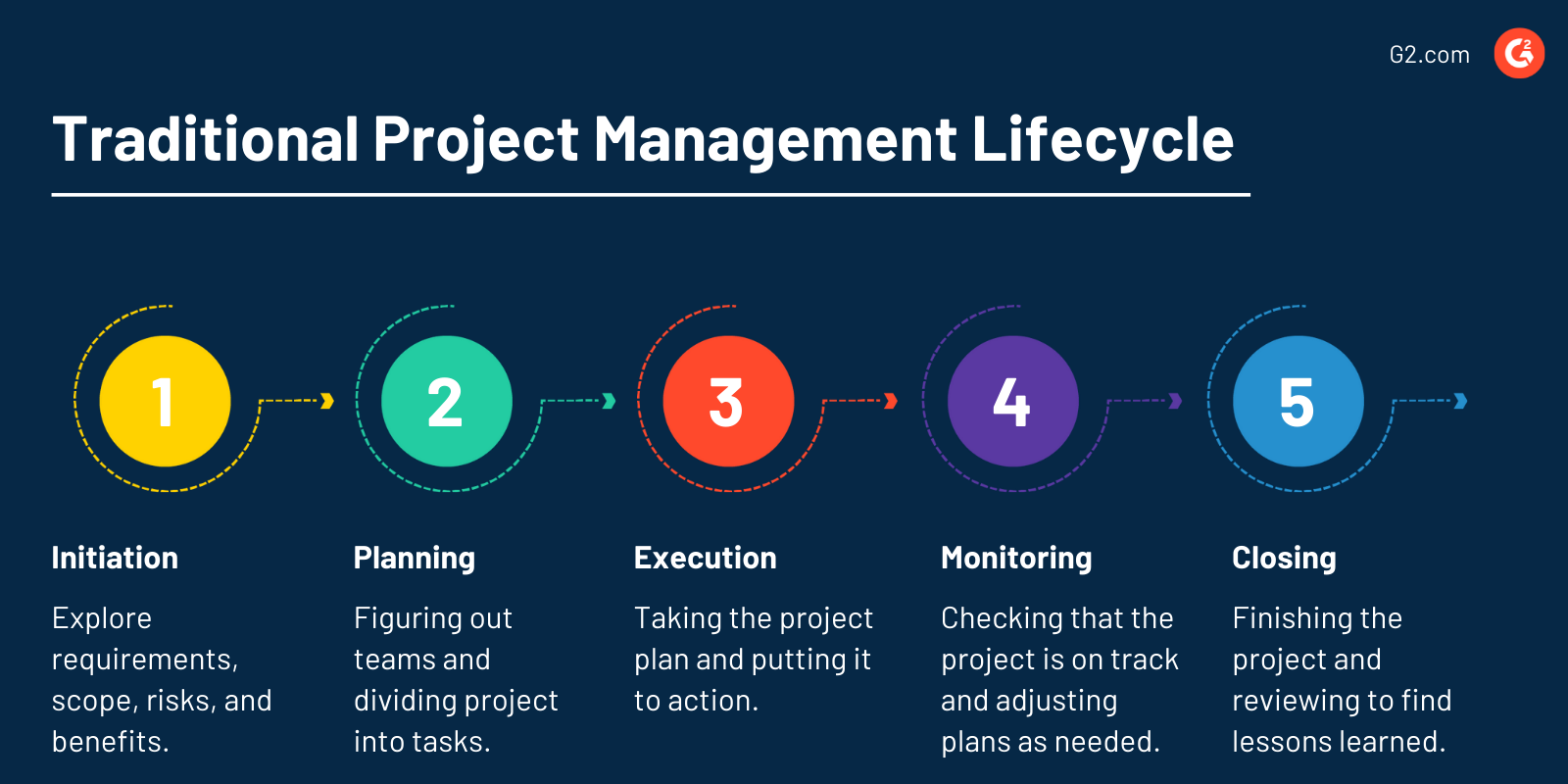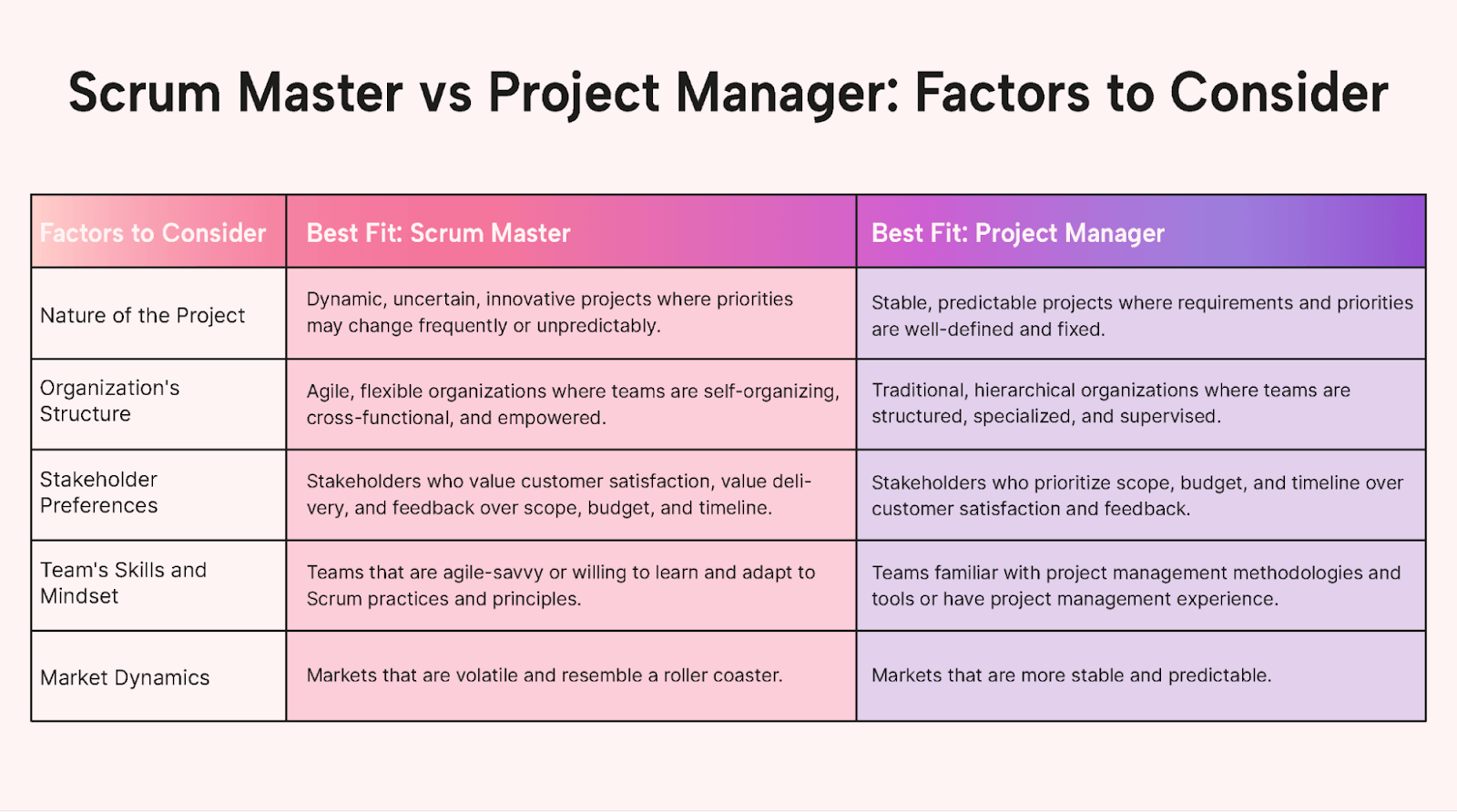Both the roles of a Scrum Master and a Project Manager fill the void within an agile team but with distinct responsibilities. The Scrum Master guides the team through the implementation of Scrum principles and practices while working under the Scrum framework. The Project Manager uses the skills of a project manager in managing the project lifecycle and the project objectives.
The Scrum Master believes in continuous improvement, has a mentality of servant leadership; the project manager performs risk management and sprint planning. Using the agile project management methodologies, the Scrum Master ensures a smooth functioning of the Scrum team, while the Project Manager is overall in-charge of the entire project based on the agile methods. The roles, though diverse, are complementary for successful, seamless project execution.
Introduction to scrum master and project manager
A Scrum Master is a leader serving and at the same time guiding the effective working of an agile team under the focus of the Scrum framework. He has the role of ensuring the team's understanding of agile practices and Scrum methodologies, enabling sprint planning, and supporting the team in achieving continuous improvement. Servant leadership is their guiding principle in this role. On the other hand, a Project Manager is a professional who takes the help of his project management skills to define and meet project objectives while working throughout the project lifecycle. Instrumental in risk management too is the Project Manager. Instrumental in agile project management, be it standalone or in any Scrum team, one of their major roles is to make sure that the objectives of the project line up with the business goals.
Definition of scrum master
A Scrum Master is an agile team leader working under the Scrum framework. They Should encourage and support Scrum principles such as transparency, inspection, and adaptation. This role is of servant leader who abandons any traditional command-control kind of styles of management, but still, he rather focuses on facilitating the team with self-organization and cross-functionality to let agile practices and methodologies help in achieving better efficiency and effectiveness of agile teams.
Project management skills involved include: sprint planning, continuous improvement, overseeing project lifecycle, risk management, and ensuring that objectives are meeting the expectations of agile project management. In the end, their sole responsibility is to guarantee The Scrum team's success.
Definition of project manager

A person referred to as a Project Manager in Scrum Methodologies is a leader using agile project management who depends on servant leadership and agile practices to let the people lead through the complexity of a project lifecycle and help in achieving the end goal of the project. He should have related to the project management skills, such as those for risks and sprint planning, which are essential for effective continuous improvement within the agile team. He is the spine of any Scrum team, as his main function is about shaping and executing Scrum Principles within the Scrum framework. In the end, he should ensure and promote communication, agility, and a strong feedback system to achieve project goals on schedule and within budgets.
Understanding the scrum framework
In the realm of Scrum, the difference between a Scrum Master and a Project Manager can often seem blurred. To fully understand these roles, it’s important to familiarize oneself with Scrum tools, as they are the primary resources used to manage Scrum processes. These tools provide efficiency and clarity to the teamwork, bridging the gap between these two critical roles.
The Scrum framework, which is essentially a part of agile project management, proposes iterative and incremental project lifecycle. This agile methodology focuses on team collaborations and continuous improvement. Scrum principles are: servant leadership, self-organization, and adaptable, fast problem-solving, and principal elements to Scrum involve sprint planning, where the agile team establishes project objectives and spots potential risks.
Strong project management skills are vital in the Scrum team because at this point, it is vital to make sure about productivity and effectiveness. Agile practices, including daily meetings or Scrums and frequent reviews, will have a part in the success of implementing Scrum methodologies.
Key principles of scrum
The Scrum framework contains a couple of key principles without which the agile methodology would not be complete. One is the principle of empirical control, which maintains that transparency, inspection, and continuous adaptation is maintained to assure continuous improvement. The Scrum practices assure that a decision-making framework that is collaborative is achieved by the agile team towards the set out project objectives.
Another critical practice is the practice of servant leadership within the Scrum Master, who possesses the role of supporting and empowering the team rather than managing them. This, combined with sprint planning, forms the backbone of the Scrum methodologies. This methodology, therefore, ensures a most potent combination of project management skills and risk management throughout the lifecycle of the project.
Roles in a scrum team
The Scrum team, under the Scrum framework, does practice agile methodologies through three well-discrepant roles, all of which are integral to the success of an agile project. These are the product owner, the Scrum Master, and the development team. The product owner is responsible for defining the project objectives and, in essence continuing, to refine the product backlog. The Scrum Master uses servant leadership on his part to facilitate sprint planning, removes obstacles, and ensures that the team follows the rules of Scrum.
The development team works on agile project management tasks in the project lifecycle, and its main objective is to center on value addition at every step and continuous improvement. Each member of the agile team also adds to the skills of risk management and project management, which are vital for the success of a project in an agile methodological environment.
Understanding traditional project management

In such a linear approach, project objectives and resources are clearly defined and followed in the project lifecycle. Heavy project management skills should be applied, such as planning, organization, securing, and managing resources to accomplish certain project goals. An extremely important critical element is risk management—the identification, evaluation, and prioritization of the risks with a view to minimize their impact on the project. On the contrary, agile project management, including Scrum methodologies, Scrum framework, and Scrum principles, is iterative and flexible.
An agile team focuses on continuous improvement, servant leadership, and sprint planning. A Scrum team would focus on: Delivering incrementally valuable, high-quality products in the process of continuously improving project visibility and ability.
Key principles of project management
Project management is the process that is guiding the project from the start until its end. Project management is the key to completing any project. The agile approach to project management, through its first principle, helps in finding continuous improvement and change throughout the lifecycle of the project. An agile methodology is a sequence of short phases of work, or 'sprints', designed by the agile team with planning of sprints and reviewed through Scrum framework.
.webp)
Second, team collaboration at work is through the premises and methodologies of Scrum. The Scrum team must be involved in a servant leadership style interaction in which the team leads to satisfy the needs of the members for its efficient achievement of the project objectives.
In addition, project management requires the various tools and techniques of project management skills, one of them being risk management to identify, assess, and prioritize uncertainties in a manner that helps in risk management that would affect the outcome of the project.
In that way, agile practices in projects make them adaptable to change and give them resilience.

Bonsai offers comprehensive solutions that bring together every aspect of your projects under one intuitive platform. They make it easier to plan, schedule, and use resources like time, people, and money efficiently, ensuring projects are completed successfully. Bonsai is the the best project resource management solutions simplify the complex task of organizing and allocating a project's resources.
Roles in a project management team
There are a number of important roles that team members in a project management setup need to cover. One is that of the agile team being its Project Manager, who leads the team into the practices of agile with the flavor of Scrum principles and supports the project life cycle from the planning of sprints to risk management. This is very much in line with project management practices and demonstrates servant leadership.
The Scrum Master is also very important in the team, acting within the framework of Scrum to facilitate improvements in communication which continuously improve the Scrum process, focusing on the project goal. Thirdly, all members play a part in the project by participating in the Scrum team, through active contribution to the successful achievement of project deliverables.
Role of a Scrum Master

The Scrum Master plays a significant role in implementing agile practices and Scrum principles within the agile team. As a servant leader, they guide the team, ensuring they adhere to the Scrum framework and consistently apply agile methodology. Key responsibilities include sprint planning, facilitating communication and collaboration, and promoting continuous improvement.
This role requires robust project management skills, including risk management, managing the project lifecycle, and driving agile project management. The Scrum Master focuses on aiding the Scrum team in meeting project objectives, resolving any impediments, and fostering a culture of ownership, collaboration, and transparency.
Responsibilities of a scrum master
The Scrum Master is a key role in the Scrum framework, responsible for facilitating the agile team and ensuring adherence to Scrum principles. They use strong project management skills to lead the team through the project lifecycle, including sprint planning, risk management, and pursuit of project objectives.
The Scrum Master practices servant leadership, continuously coaching the team towards improved performance and efficiency. They also foster a culture of continuous improvement, using agile practices and methodologies to evolve processes, resolve impediments, and adapt to change. Balancing these various responsibilities, a Scrum Master is crucial in the success of agile project management.
Skills required for a scrum master
A Scrum Master needs to have a strong understanding of Scrum principles and the Scrum framework. This entails not only the theory but also the practical application in managing an agile team. They are also responsible for facilitating sprint planning and ensuring that agile practices are implemented effectively in the project lifecycle.
Additionally, project management skills are essential for a Scrum Master as they need to manage project objectives, risk management, and the overall agile project management. They also need to possess servant leadership qualities, constantly promoting continuous improvement within the Scrum team. Their role is pivotal in ensuring Scrum methodologies are adhered to and the team is consistently moving towards the project goals.
Scrum Master in agile software development: Jira as an example
Ais the most important person in Agile Software Development, an expert in practicing servant leadership, leading the agile team toward continuous improvement. A Scrum Master guides the team on using principles and methodologies related to Scrum, in agile practices of project management, to lead it through the lifecycle of the project. For example, in Jira, the Scrum Master should work on risk management and define project goals through sprint planning. This is done by coordinating the Scrum team within the Scrum Framework to have the best delivery and efficiency of the development cycle.
Role of a project manager
A Project Manager facilitates the success of an agile team by applying Scrum principles and agile practices throughout the project lifecycle. They take on the role of a servant leader, using their project management skills to guide the team through sprint planning, managing risk, and overseeing continuous improvement efforts.
Under the Scrum framework, the Project Manager ensures every member of the Scrum team understands project objectives. They play a vital role in agile project management, directing the team towards the achievement of these objectives while fostering an environment conducive to growth and adaptation.
Responsibilities of a project manager
A Project Manager is fundamentally responsible for applying agile project management methodologies to the project lifecycle. They undertake the Key Role of sprint planning, overseeing the Scrum team, implementing Scrum principles within the agile team, and facilitating effective use of the Scrum framework. The Project Manager, therefore, helps to streamline project objectives and ensure continuous improvement.
Moreover, their responsibility extends to risk management, executing servant leadership, and enhancing team performance. By ensuring adherence to agile practices, the Project Manager employs project management skills, driving the success of the project while promoting A strong agile Work culture. They are committed to bringing best practices and manufacturing meaningful output every sprint cycle.
Skills required for a project manager
A Project Manager must be proficient in agile project management and possess excellent project management skills. They should understand and apply Scrum principles and agile practices in managing the project lifecycle. This includes sprint planning, ensuring continuous improvement, and effectively overseeing a Scrum team.
Furthermore, they should have a clear understanding of the Scrum framework and agile methodology to guide the agile team towards achieving project objectives. In addition, they must have core skills in risk management and uphold the servant leadership role, a critical aspect of Scrum methodologies.
Project manager in traditional software development: Microsoft project as an example
In traditional software development, a Project Manager like those using Microsoft projects, is key in applying agile project management strategies to meet project objectives. They help facilitate an agile team through the project lifecycle, utilizing Scrum principles within the Scrum framework to ensure efficient sprint planning.
Their role also extends to risk management, fostering a culture of continuous improvement, underscoring agile practices and ensuring the accomplishment of the project's objectives. Imbibing the concept of servant leadership, they guide the Scrum team towards success. These encompass the central project management skills required in this capacity.
Key differences between scrum master and project manager
In Scrum framework, a Scrum Master operates under the servant leadership model, embodying agile practices and principles to facilitate the Scrum team's progress and well-being. The Scrum Master focuses more on continuous improvement and sprint planning, acting as a facilitator and a coach, rather than being in a command-and-control role.
In contrast, a Project Manager, using his project management skills, has a broader role in traditional project management. They are responsible for the project lifecycle, including risk management and achieving project objectives. They act more as a project leader, responsible for delivering the end product within the defined scope, time, and cost.
Difference in responsibilities
Scrum principles and the Scrum framework differ Greatly In responsibilities compared to traditional project management skills. The latter focuses on a leader who directs and controls, whereas agile practices encourage a servant leadership approach. This requires prioritizing the needs of the agile team and helping them achieve project objectives.
The agile methodology also promotes continuous improvement throughout the project lifecycle, involving regular sprint planning and risk management. Thus, an agile project management system differs in that it evolves with the project, embodying the flexible and dynamic nature of Scrum methodologies.
Difference in skills
Agile project management requires an array of diverse skills, notably among them are Scrum principles, servant leadership and project management skills. Practitioners in the Scrum framework often develop deep expertise in sprint planning, risk management and understanding the project lifecycle.
The strength of an agile team lies in their commitment to continuous improvement, agile practices and the achievement of project objectives. Understanding and implementing Scrum methodologies are also crucial skills that amplify the effectiveness of the team.
Difference in approach to project management
The agile project management approach differs from traditional methods, applying agile practices and Scrum principles to manage the project lifecycle efficiently. This strategy values responsiveness to change, risk management, and continuous improvement. An agile team organized under the Scrum framework operates on a series of short-term goals decided during sprint planning meetings, fostering flexibility and adaptability.
On the other hand, traditional project management relies on structured planning, once set project objectives, and a linear workflow. However, this approach may not permit quick changes or adaptations, unlike agile methodologies.
Both methods require competent project management skills, but agile teams specifically benefit from servant leadership that empowers each member of the Scrum team.
Choosing between scrum master and project manager for your agency

Your options will largely come down to either a Scrum Master or a Project Manager of the agency. If the team you work with is really following Agile, in particular the Scrum framework, then a Scrum Master can work best for your cause. A Scrum Master possesses very good knowledge about Scrum practices, practices servant leadership, and helps in continual improvement and sprint planning.
On the other hand, if your agency works using a more traditional approach and wants someone to see that the project is seen throughout its life cycle, taking care of risk management and to ensure that goals of the project are met, then a Project Manager will be the right one. He usually holds quite eloquent Agile Project Management skills.
When to choose a scrum master
The choice of a Scrum Master is very critical; it should be done at the early stage of the project life cycle. The candidate must have very sound skills in project management and must possess an in-depth understanding of all the principles in agile project management and Scrum. This is very important for effective sprint planning and making sure that the agile team works within the Scrum framework. He should also show qualities of servant leadership that will help in illumination, foster a culture of continuous improvement, and risk management within the Scrum team; this is very essential in the process of attaining all the project objectives and maintaining adherence to agile practices and Scrum methodologies.
When to choose a project manager
A Project Manager should get identified right from the starting of the project lifecycle. This is when the experienced professional will look upon project management skills in supporting Scrum principles, risk management, and sprint planning. This role will help in accomplishing the goals of the project and, at the same time, ensures the consistent enhancement of agile practices. An ideal Project Manager for an agile team should have requisite knowledge of the Scrum framework and agile project management coupled with a servant leadership attitude. They lead the Scrum team inside the agile methodology, meanwhile with a focus to complete the project successfully.
Conclusion: Scrum master vs project manager
This is the comparison of the different roles between the scrum master and the project manager in the agile project management lifecycle. The Scrum Master, an adherent to agile practices, is well-versed in the Scrum methodology and serves mainly as a servant leader, facilitating Scrum teams and holding regular meetings to champion the principles of agile.
On the other hand, a Project Manager utilizes the skill involved in project management to ensure that resources are acquired and that there is supervisory control of risk in order to ensure that project objectives are consistent with the wider goals and objectives of the organization. Both these roles stand core within the team of agile; however, while a Scrum Master focuses on the sprint planning within the framework of Scrum, a Project Manager uses a more panoramic view in negotiating and navigating the entire life cycle of a project.







